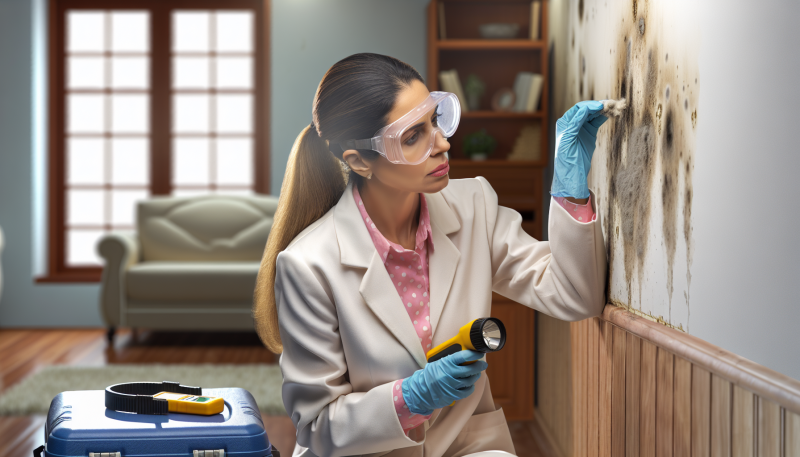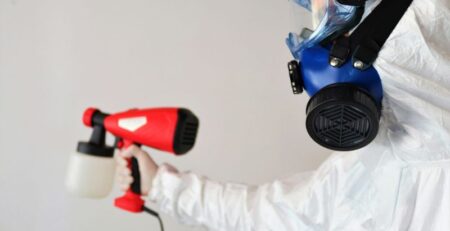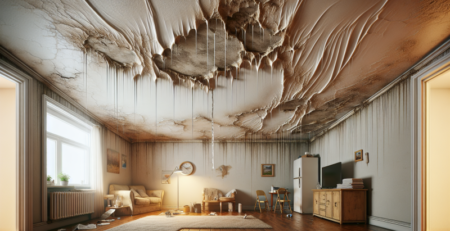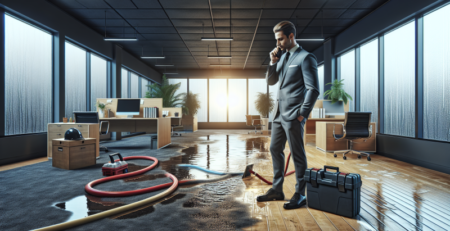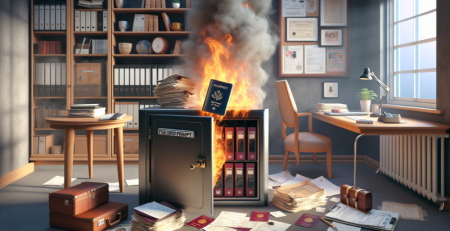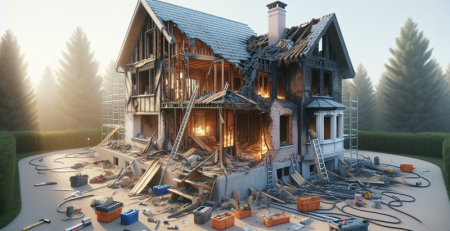Mold Remediation: Legal Responsibilities for Landlords
Mold remediation is a critical concern for landlords, especially in regions prone to moisture and humidity. Understanding the legal responsibilities surrounding mold issues is essential for property owners to ensure tenant safety and compliance with health regulations. Mold can pose serious health risks, and landlords must be proactive in addressing any mold growth in their properties. This includes knowing when to conduct inspections, how to respond to tenant complaints, and the necessary steps for effective mold removal. At Kraus Restoration, NJ’s leaders in water, mold, and fire damage restoration, we emphasize the importance of timely and professional mold remediation. Our IICRC certified experts are available 24/7 to provide rapid response services throughout Central and Northern NJ. If you’re a landlord facing mold challenges, it’s crucial to stay informed about your legal obligations to protect both your tenants and your property. For immediate assistance, call us at (973) 886-2021.
Understanding Mold: What Landlords Need to Know
Mold is a pervasive issue that can significantly impact both the health of tenants and the legal responsibilities of landlords. Understanding mold is crucial for landlords to ensure they meet their obligations and maintain safe living conditions for their tenants. Mold thrives in damp, humid environments and can grow on various surfaces, including wood, drywall, and carpets. It can lead to serious health problems, including respiratory issues, allergic reactions, and other health complications, particularly for vulnerable populations such as children, the elderly, and individuals with pre-existing health conditions.
Landlords must recognize that mold is not just a cosmetic issue; it poses real health risks and can lead to costly remediation efforts if not addressed promptly. According to the Centers for Disease Control and Prevention (CDC), exposure to mold can cause a range of health effects, including nasal congestion, throat irritation, coughing, and skin irritation. In some cases, it can also exacerbate asthma and other respiratory conditions. Therefore, it is essential for landlords to take proactive measures to prevent mold growth and to respond swiftly when mold is discovered.
One of the key responsibilities of landlords is to maintain their properties in a habitable condition. This includes ensuring that the property is free from mold and other health hazards. Failure to address mold issues can lead to legal repercussions, including lawsuits from tenants and potential fines from local health departments. Landlords should familiarize themselves with local laws and regulations regarding mold and tenant rights, as these can vary significantly by jurisdiction.
Preventing mold growth starts with proper property maintenance. Landlords should regularly inspect their properties for signs of water damage, leaks, or excessive moisture. Common areas where mold can develop include bathrooms, kitchens, basements, and around windows. Implementing proper ventilation systems, using dehumidifiers, and ensuring that gutters and downspouts are functioning correctly can help reduce moisture levels in the property.
In the event that mold is discovered, landlords must act quickly to remediate the issue. This often involves hiring a professional mold remediation service to assess the extent of the problem and to safely remove the mold. It is important for landlords to document the situation, including taking photographs and keeping records of communications with tenants regarding the mold issue. This documentation can be crucial in the event of legal disputes.
Landlords should also be aware of their obligations to inform tenants about mold issues. In many jurisdictions, landlords are required to disclose known mold problems to prospective tenants. Transparency is key in maintaining a good landlord-tenant relationship and can help prevent legal issues down the line.
In addition to legal responsibilities, landlords should consider the financial implications of mold. Properties with mold issues can suffer from decreased property values and increased turnover rates as tenants seek healthier living conditions. Investing in regular maintenance and mold prevention strategies can save landlords money in the long run by avoiding costly remediation and legal fees.
To summarize, understanding mold is essential for landlords to fulfill their legal responsibilities and to provide safe living environments for their tenants. By being proactive in mold prevention, responding quickly to mold issues, and maintaining open communication with tenants, landlords can protect their properties and their tenants’ health.
For further information on mold remediation and legal responsibilities, landlords can explore resources such as the CDC’s guidelines on mold and health, as well as local health department regulations. Additionally, landlords may find it beneficial to consult with professionals in the field of mold remediation to ensure they are taking the appropriate steps to manage mold in their properties.
For more detailed insights into mold cleanup and prevention strategies, visit our mold cleanup services page. If you have any questions or need assistance, feel free to contact us for expert guidance.
Legal Framework: Federal and State Regulations on Mold
Mold remediation is a critical issue for landlords, as the presence of mold can pose significant health risks to tenants and lead to costly property damage. Understanding the legal framework surrounding mold is essential for landlords to ensure compliance with federal and state regulations. At the federal level, there are no specific laws that directly address mold; however, the Environmental Protection Agency (EPA) provides guidelines and recommendations for mold management and remediation. The EPA emphasizes the importance of moisture control and encourages property owners to address water leaks and dampness promptly to prevent mold growth. Additionally, the Occupational Safety and Health Administration (OSHA) has established standards for workplace safety that can indirectly relate to mold exposure, particularly in commercial properties.
On the state level, regulations regarding mold can vary significantly. Many states have enacted laws that require landlords to maintain safe and habitable living conditions, which includes addressing mold issues. For instance, some states mandate that landlords disclose any known mold problems to prospective tenants. Furthermore, several states have specific mold-related statutes that outline the responsibilities of landlords in managing mold infestations. These laws often require landlords to conduct mold assessments and remediation when mold is detected, ensuring that the living environment is safe for tenants.
In addition to state laws, local ordinances may also impose additional requirements on landlords regarding mold management. It is crucial for landlords to be aware of their local regulations, as these can dictate specific actions that must be taken in the event of a mold problem. Failure to comply with these regulations can result in legal consequences, including fines and potential lawsuits from tenants.
Landlords should also consider the implications of mold on tenant rights. Many states allow tenants to take legal action if they believe their health has been compromised due to mold exposure or if their landlord has failed to address mold issues in a timely manner. This can lead to significant financial liabilities for landlords, making it imperative to act swiftly and effectively when mold is discovered.
To mitigate risks associated with mold, landlords should implement proactive measures, such as regular inspections of their properties, prompt repairs of water leaks, and maintaining proper ventilation. Additionally, having a clear mold remediation plan in place can help landlords respond quickly to mold issues, minimizing potential damage and legal repercussions.
In conclusion, the legal framework surrounding mold remediation is complex and varies by jurisdiction. Landlords must be diligent in understanding both federal and state regulations to ensure compliance and protect their properties and tenants. By staying informed and proactive, landlords can effectively manage mold issues and fulfill their legal responsibilities. For more information on mold cleanup services, visit mold cleanup or contact us for assistance with your property management needs at contact.
Responsibilities of Landlords in Mold Prevention
Landlords have a critical role in ensuring the safety and well-being of their tenants, particularly when it comes to mold prevention. Mold can pose serious health risks, including respiratory issues, allergies, and other health complications. Therefore, it is essential for landlords to understand their responsibilities in preventing mold growth within their properties. One of the primary responsibilities of landlords is to maintain the premises in a habitable condition. This includes addressing any water leaks, ensuring proper ventilation, and managing humidity levels. Regular inspections of the property can help identify potential issues before they escalate into significant mold problems. Landlords should also be proactive in educating tenants about the importance of reporting any signs of water damage or mold growth immediately. This communication can foster a collaborative environment where both parties work together to maintain a healthy living space. Furthermore, landlords must comply with local and state regulations regarding mold prevention and remediation. This may involve adhering to specific building codes, conducting regular maintenance, and ensuring that any mold remediation efforts are performed by qualified professionals. In addition to legal obligations, landlords should consider implementing preventive measures such as installing dehumidifiers in areas prone to moisture, ensuring that gutters and downspouts are functioning correctly, and sealing any cracks or openings that could allow water intrusion. By taking these steps, landlords can significantly reduce the risk of mold growth and create a safer environment for their tenants. For landlords seeking to understand more about their responsibilities, it is advisable to consult with professionals in the field of mold remediation and property management. Resources such as Kraus Restoration can provide valuable insights into best practices for mold prevention and remediation. Additionally, landlords should familiarize themselves with the services available for mold cleanup, which can be found at Kraus Restoration’s mold cleanup services. By prioritizing mold prevention and addressing any issues promptly, landlords can protect their properties, ensure tenant satisfaction, and fulfill their legal responsibilities effectively.
Tenant Rights: What to Expect Regarding Mold Issues
Mold issues in rental properties can be a significant concern for tenants, as they can affect both health and living conditions. Understanding tenant rights regarding mold is crucial for anyone renting a home or apartment. Tenants have the right to live in a safe and habitable environment, which includes protection from mold growth. When mold is present, it can lead to various health problems, including respiratory issues, allergies, and other serious conditions. Therefore, it is essential for tenants to know what to expect when dealing with mold issues in their rental properties.
First and foremost, tenants should be aware that landlords have a legal obligation to maintain the property in a habitable condition. This includes addressing any mold problems that may arise. If a tenant discovers mold, they should promptly notify their landlord in writing, detailing the location and extent of the mold growth. This written communication serves as a formal record of the issue and can be important if further action is needed. Landlords are typically required to respond to such notifications within a reasonable timeframe and take appropriate action to remediate the mold.
In many jurisdictions, the law requires landlords to conduct regular inspections and maintenance to prevent mold growth. This includes ensuring proper ventilation, fixing leaks, and addressing any water damage promptly. If a landlord fails to take these preventive measures and mold develops as a result, they may be held liable for any health issues or property damage that occurs. Tenants should familiarize themselves with local housing codes and regulations, as these laws can vary significantly by location.
If a landlord does not respond adequately to a mold complaint, tenants have several options. They can follow up with additional written requests, emphasizing the urgency of the situation. If the landlord continues to neglect the issue, tenants may consider contacting local health or housing authorities to report the problem. These agencies can often provide guidance and may conduct inspections to determine if the property is in violation of health and safety codes.
In some cases, tenants may have the right to withhold rent until the mold issue is resolved. However, this action should be taken with caution and ideally after seeking legal advice. Tenants should also be aware that withholding rent can lead to eviction proceedings if not handled correctly. It is crucial to document all communications with the landlord and keep records of any health issues that arise due to mold exposure.
Tenants should also consider their rights regarding the return of their security deposit if mold issues are present. If mold is discovered after a tenant moves out, landlords may attempt to deduct cleaning or repair costs from the security deposit. However, if the mold was present during the tenancy and the tenant reported it, they may have grounds to dispute these charges. Understanding local laws regarding security deposits can help tenants protect their rights in these situations.
In addition to legal rights, tenants should prioritize their health and safety when dealing with mold. If mold is present, it is advisable to limit exposure as much as possible. This may include avoiding the affected area and seeking medical attention if health issues arise. Tenants should also consider consulting with a mold remediation professional to assess the situation and provide guidance on the best course of action.
In summary, tenants have specific rights when it comes to mold issues in rental properties. They are entitled to a safe and habitable living environment, and landlords have a legal obligation to address mold problems promptly. By understanding their rights and responsibilities, tenants can take appropriate action to ensure their living conditions are safe and healthy. For more information on mold cleanup and remediation, you can visit mold cleanup services or learn about water cleanup to prevent future mold issues. If you have further questions or need assistance, do not hesitate to contact a professional for help.
Identifying Mold: Signs Landlords Should Look For
Mold is a pervasive issue that can pose significant health risks and damage to properties, making it crucial for landlords to be vigilant in identifying its presence. Understanding the signs of mold is essential for maintaining a safe and healthy living environment for tenants. One of the first indicators of mold growth is a musty odor, which often suggests that moisture is present and conducive to mold development. This smell can be particularly strong in areas that are prone to dampness, such as basements, bathrooms, and kitchens. Landlords should also be on the lookout for visible signs of mold, which can appear as black, green, or white patches on walls, ceilings, or other surfaces. These patches may vary in texture, appearing fuzzy or slimy, depending on the type of mold. Additionally, water stains or discoloration on walls and ceilings can indicate past or ongoing moisture issues, which are often linked to mold growth.
Another critical sign to monitor is the presence of condensation on windows or walls, as this can create an ideal environment for mold to thrive. Landlords should also pay attention to any reports from tenants regarding health issues, such as respiratory problems, allergies, or unexplained illnesses, as these can be exacerbated by mold exposure. Furthermore, if tenants notice an increase in pests, such as rodents or insects, it may indicate underlying moisture problems that could lead to mold growth. Regular inspections of the property, especially in high-risk areas, can help landlords catch mold issues early. If any signs of mold are detected, it is essential to take immediate action to address the moisture source and begin remediation efforts. For more information on effective mold cleanup strategies, landlords can explore our mold cleanup services. Additionally, understanding the legal responsibilities surrounding mold remediation can help landlords navigate their obligations to ensure tenant safety. For further assistance or to learn more about our comprehensive restoration services, please visit our services page or contact us directly.
The Importance of Timely Mold Remediation
Mold remediation is a critical process that involves the identification, removal, and prevention of mold growth in residential and commercial properties. Timely mold remediation is essential for several reasons, particularly when considering the legal responsibilities of landlords. Mold can pose significant health risks to tenants, including respiratory issues, allergic reactions, and other serious health conditions. Therefore, landlords must act swiftly to address any mold issues that arise in their properties. Delaying remediation can lead to more extensive mold growth, which not only exacerbates health risks but also increases the potential for property damage.
When mold is allowed to flourish, it can compromise the structural integrity of a building, leading to costly repairs and renovations. This can create a financial burden for landlords, especially if they are held liable for damages resulting from mold exposure. Moreover, many states have specific regulations regarding mold in rental properties, requiring landlords to maintain a safe living environment for their tenants. Failure to comply with these regulations can result in legal repercussions, including lawsuits and fines.
Additionally, timely mold remediation can enhance tenant satisfaction and retention. Tenants are more likely to renew their leases and recommend properties to others if they feel their health and safety are prioritized. A proactive approach to mold issues demonstrates a landlord’s commitment to maintaining their property and caring for their tenants. This can lead to a positive reputation in the rental market, which is invaluable for attracting new tenants.
Furthermore, the process of mold remediation involves not just the removal of visible mold but also the identification of underlying moisture issues that contribute to mold growth. This comprehensive approach ensures that the problem is resolved at its source, preventing future occurrences. Landlords who invest in professional mold remediation services can benefit from expert assessments and solutions that address both immediate and long-term mold concerns.
In conclusion, timely mold remediation is not just a matter of property maintenance; it is a legal and ethical obligation for landlords. By addressing mold issues promptly, landlords can protect their tenants’ health, preserve their property value, and comply with legal requirements. For more information on effective mold remediation strategies, landlords can explore mold cleanup services that provide comprehensive solutions tailored to their needs. Additionally, understanding the broader implications of mold in rental properties can be crucial, and landlords are encouraged to learn more about their responsibilities by visiting about us. For any inquiries or to schedule a consultation, landlords can reach out through our contact page.
Best Practices for Mold Remediation in Rental Properties
Mold remediation in rental properties is a critical responsibility for landlords, as it directly impacts tenant health and safety. To effectively manage mold issues, landlords should adopt best practices that not only comply with legal obligations but also foster a safe living environment for tenants. The first step in mold remediation is to conduct a thorough inspection of the property to identify areas of moisture and mold growth. This often involves checking hidden spaces such as behind walls, under sinks, and in basements or attics. Utilizing professional services can enhance the accuracy of this inspection, ensuring that all mold sources are identified. Once mold is detected, landlords must act swiftly to contain the affected areas to prevent further spread. This may involve sealing off the contaminated zones and using air filtration systems to capture mold spores.
After containment, the next phase is removal. It is essential to follow industry standards for mold cleanup, which typically includes wearing protective gear, using specialized equipment, and employing effective cleaning solutions. Landlords should consider hiring certified mold remediation professionals who are trained in safe and effective removal techniques. This not only ensures compliance with health regulations but also minimizes the risk of cross-contamination. Following the removal process, it is crucial to address the underlying moisture problem that caused the mold growth in the first place. This may involve repairing leaks, improving ventilation, or even implementing dehumidification systems. Landlords should also educate tenants about the importance of reporting water damage or mold sightings immediately to facilitate prompt action.
Documentation is another vital aspect of mold remediation. Landlords should keep detailed records of inspections, remediation efforts, and communications with tenants regarding mold issues. This documentation can serve as evidence of compliance with legal responsibilities and can protect landlords in case of disputes. Additionally, landlords should consider implementing a proactive maintenance plan that includes regular inspections and moisture control measures to prevent mold growth before it starts. This could involve routine checks of plumbing systems, roof integrity, and ventilation systems. By fostering open communication with tenants, landlords can encourage them to report any signs of mold or moisture issues early, allowing for quicker remediation efforts.
Finally, landlords should stay informed about local laws and regulations regarding mold remediation in rental properties. Understanding these legal responsibilities not only helps in compliance but also enhances the overall safety and satisfaction of tenants. By following these best practices, landlords can effectively manage mold issues, ensuring a healthy living environment and protecting their investment in the property. For more information on mold cleanup services, you can visit mold cleanup or explore our services for comprehensive property restoration solutions. If you have any questions or need assistance, feel free to contact us.
Documentation and Communication: Keeping Records of Mold Issues
Effective documentation and communication are crucial components in managing mold issues, particularly for landlords who have legal responsibilities regarding mold remediation. Keeping thorough records not only helps in addressing current mold problems but also serves as a protective measure against potential legal disputes. Landlords should maintain detailed documentation of any mold-related incidents, including the date of discovery, the location of the mold, the extent of the problem, and any actions taken to remediate the issue. This documentation should also include communication with tenants, such as notifications about mold presence, remediation plans, and follow-up inspections. By keeping a clear record of these interactions, landlords can demonstrate their proactive approach to mold management and compliance with health and safety regulations. Furthermore, it is essential to document any professional assessments or remediation efforts conducted by certified mold remediation specialists. This includes invoices, reports, and any warranties or guarantees provided by the service providers. Such records not only validate the landlord’s efforts to resolve the issue but also provide tenants with assurance that the problem is being handled appropriately. In addition to written records, visual documentation, such as photographs of the mold before and after remediation, can be invaluable. These images can serve as evidence of the condition of the property and the effectiveness of the remediation efforts. Landlords should also consider implementing a communication plan that outlines how they will inform tenants about mold issues and remediation processes. This plan should include timelines for notifications, updates on remediation progress, and instructions for tenants on how to report any new mold concerns. By fostering open lines of communication, landlords can build trust with their tenants and ensure that everyone is informed and engaged in the mold management process. Ultimately, thorough documentation and effective communication are not just best practices; they are essential strategies for landlords to fulfill their legal responsibilities and maintain healthy living environments for their tenants. For more information on mold cleanup services, visit mold cleanup or learn about our comprehensive services to address various property issues. If you have any questions or need assistance, feel free to contact us.
Liability and Legal Consequences for Landlords
Landlords have a significant responsibility when it comes to maintaining safe and habitable living conditions for their tenants. One of the critical aspects of this responsibility is addressing mold issues that may arise in rental properties. Mold can pose serious health risks, including respiratory problems and allergic reactions, making it essential for landlords to act promptly and effectively when mold is discovered. Failure to address mold issues not only jeopardizes the health of tenants but can also lead to substantial legal consequences for landlords.
Landlords are typically required by law to provide a safe and habitable environment, which includes ensuring that the property is free from mold. If a landlord neglects this duty and mold develops, they may be held liable for any resulting health issues or property damage. Tenants have the right to seek compensation for medical expenses, property damage, and even emotional distress caused by mold exposure. In many jurisdictions, tenants can also pursue legal action to recover costs associated with mold remediation if the landlord fails to take appropriate action.
Moreover, landlords must be aware of local and state regulations regarding mold. Some areas have specific laws that dictate how quickly landlords must respond to mold complaints and what actions they must take to remediate the issue. Failure to comply with these regulations can result in fines, penalties, and further legal action. It is crucial for landlords to stay informed about the laws governing mold in their area and to implement proactive measures to prevent mold growth, such as regular inspections and maintenance of plumbing and ventilation systems.
In addition to potential legal action from tenants, landlords may also face liability claims from third parties, such as neighbors or visitors, who may be affected by mold exposure. If mold spreads from a rental property to adjacent units or properties, landlords could be held responsible for any health issues or property damage that occurs as a result. This highlights the importance of not only addressing mold issues promptly but also taking preventive measures to minimize the risk of mold growth in the first place.
Landlords should also consider the financial implications of mold-related legal issues. The costs associated with mold remediation can be significant, especially if the problem is extensive. Additionally, legal fees and potential settlements can add up quickly if a tenant decides to pursue a lawsuit. To mitigate these risks, landlords should invest in regular property maintenance and inspections, as well as establish clear communication channels with tenants regarding mold concerns. By fostering a proactive approach to mold management, landlords can protect their investments and ensure the safety and well-being of their tenants.
In conclusion, the liability and legal consequences for landlords regarding mold remediation are substantial. Landlords must take their responsibilities seriously and act swiftly to address any mold issues that arise in their properties. By understanding their legal obligations, staying informed about local regulations, and implementing preventive measures, landlords can minimize their risk of legal action and ensure a safe living environment for their tenants. For more information on mold cleanup and remediation services, landlords can visit mold cleanup or learn about the importance of regular property maintenance at our services. If you have any questions or need assistance, feel free to contact us for expert guidance.
Insurance Considerations for Mold-Related Claims
When dealing with mold-related claims, understanding the insurance considerations is crucial for both landlords and tenants. Mold can pose significant health risks and property damage, making it essential for landlords to be aware of their legal responsibilities and the implications for their insurance policies. Typically, standard property insurance policies may cover mold damage, but this coverage can vary widely based on the specific terms and conditions of the policy. Landlords should carefully review their insurance documents to determine what is included and what is excluded regarding mold-related issues.
In many cases, insurance policies may cover mold remediation costs if the mold growth is a result of a covered peril, such as water damage from a burst pipe. However, if the mold is due to neglect or lack of maintenance, such as failing to address a persistent leak, the insurance company may deny the claim. This highlights the importance of regular property maintenance and prompt action to address any water intrusion issues. Landlords should document all maintenance activities and repairs to support their claims if mold issues arise.
Additionally, some insurance policies may have specific limits on mold coverage or may require additional endorsements to cover mold damage adequately. Landlords should consult with their insurance agents to ensure they have the appropriate coverage in place. It is also advisable to keep abreast of any changes in insurance regulations or policies that may affect mold coverage, as these can vary by state and over time.
For tenants, understanding their rights regarding mold is equally important. If mold is discovered in a rental property, tenants should notify their landlords immediately. Depending on the lease agreement and local laws, landlords may be legally obligated to address mold issues in a timely manner. If a landlord fails to act, tenants may have grounds for legal action or may be able to seek compensation for damages through their own renter’s insurance policies, if applicable.
In conclusion, both landlords and tenants must navigate the complexities of mold-related claims with a clear understanding of their insurance policies and legal responsibilities. Regular property maintenance, prompt communication, and thorough documentation can help mitigate risks associated with mold and ensure that both parties are protected. For more information on mold remediation and related services, landlords and tenants can explore mold cleanup options and learn about the importance of water cleanup to prevent mold growth. For any inquiries or assistance, feel free to contact us.
Working with Professionals: When to Hire Mold Remediation Experts
Mold can pose serious health risks and structural damage to properties, making it essential for landlords to address mold issues promptly and effectively. While some minor mold problems can be managed by property owners themselves, there are specific situations where hiring mold remediation experts becomes necessary. Understanding when to seek professional help is crucial for maintaining a safe living environment and fulfilling legal responsibilities as a landlord.
One of the primary indicators that it is time to hire mold remediation experts is the extent of the mold infestation. If mold is visible on a large scale or if it has penetrated porous materials like drywall or carpeting, it is advisable to consult professionals. Mold can spread rapidly, and what may seem like a small problem can quickly escalate into a larger issue if not addressed properly. Experts have the tools and knowledge to assess the situation accurately and implement effective remediation strategies.
Another critical factor to consider is the type of mold present. Certain mold species, such as black mold (Stachybotrys chartarum), can be particularly hazardous to health. If there is any suspicion that toxic mold is present, it is essential to engage professionals who can conduct thorough testing and safely remove the mold. They are equipped with protective gear and specialized equipment to handle hazardous materials, ensuring the safety of both the occupants and the property.
Landlords should also consider the source of moisture that is contributing to mold growth. If the mold issue is linked to significant water damage, such as from a burst pipe or flooding, it is crucial to address the underlying cause before remediation can occur. Professionals can provide comprehensive services that include water cleanup and mold removal, ensuring that both the moisture problem and the mold issue are resolved effectively. This holistic approach not only eliminates the immediate threat but also helps prevent future mold growth.
In addition to health and safety concerns, landlords have legal responsibilities regarding mold remediation. Many states have specific laws that require landlords to maintain habitable living conditions, which includes addressing mold issues promptly. Failure to do so can lead to legal repercussions, including tenant lawsuits or fines. By hiring mold remediation experts, landlords can demonstrate their commitment to maintaining a safe environment and fulfilling their legal obligations. Professionals can also provide documentation of the remediation process, which can be valuable in case of disputes with tenants.
Furthermore, the expertise of mold remediation specialists extends beyond just removal. They can offer valuable advice on preventing future mold growth, including recommendations for improving ventilation, controlling humidity levels, and conducting regular inspections. This proactive approach not only protects the property but also enhances tenant satisfaction and retention.
In summary, while some mold issues may be manageable for landlords, there are clear indicators that professional help is necessary. The extent of the infestation, the type of mold, the source of moisture, and legal responsibilities are all critical factors to consider. Engaging mold remediation experts ensures that the problem is addressed effectively and safely, protecting both the property and the health of its occupants. For landlords looking to learn more about mold cleanup services, mold cleanup is an essential aspect of property management that should not be overlooked. Additionally, understanding the importance of water cleanup can help prevent mold issues from arising in the first place. For further assistance or to discuss specific mold concerns, landlords can reach out through the contact page for expert guidance and support.
Preventative Measures: Reducing the Risk of Mold Growth
Mold growth can pose significant health risks and structural damage to properties, making it essential for landlords to take preventative measures to reduce the risk of mold development. Understanding the factors that contribute to mold growth is crucial for effective prevention. Mold thrives in damp, humid environments, so controlling moisture levels is the first line of defense. Landlords should ensure that properties are well-ventilated, particularly in areas prone to moisture, such as bathrooms, kitchens, and basements. Installing exhaust fans and ensuring that windows can be opened can help maintain airflow and reduce humidity. Regular maintenance checks are also vital. Landlords should inspect plumbing for leaks, check roofs for damage, and ensure that gutters are clean and functioning properly. Any signs of water intrusion should be addressed immediately to prevent mold spores from taking hold. Additionally, using mold-resistant materials during construction or renovations can significantly reduce the likelihood of mold growth. For instance, mold-resistant drywall and paints can be effective barriers against moisture. Educating tenants about the importance of reporting leaks and maintaining a clean, dry environment can further enhance mold prevention efforts. Providing clear guidelines on how to manage humidity levels, such as using dehumidifiers in particularly damp areas, can empower tenants to take an active role in preventing mold. Lastly, conducting regular inspections and mold assessments can help identify potential issues before they escalate, ensuring that properties remain safe and healthy for occupants. By implementing these strategies, landlords can significantly reduce the risk of mold growth and fulfill their legal responsibilities to provide a safe living environment. For more information on effective mold cleanup and prevention strategies, visit our mold cleanup services page. If you are interested in learning about our comprehensive restoration services, check out our services section. For any inquiries or to discuss your specific needs, please contact us today.
Case Studies: Legal Cases Involving Mold in Rental Properties
Mold in rental properties has become a significant legal issue, leading to various court cases that highlight the responsibilities of landlords and the rights of tenants. Understanding these legal precedents is crucial for both parties involved in rental agreements. One notable case involved a tenant who suffered health issues due to mold exposure in their apartment. The tenant claimed that the landlord failed to address water leaks and mold growth, which led to respiratory problems. The court ruled in favor of the tenant, emphasizing the landlord’s duty to maintain a habitable living environment. This case set a precedent that landlords must take immediate action when notified of mold issues, reinforcing the legal obligation to ensure safe living conditions.
Another important case revolved around a family who experienced extensive mold growth due to a plumbing issue that the landlord neglected to fix. The family sought damages for health problems and property damage caused by the mold. The court found that the landlord was liable for not addressing the plumbing issue promptly, which directly contributed to the mold problem. This ruling underscored the importance of timely maintenance and the legal consequences of negligence in rental properties.
In a different scenario, a landlord attempted to evict a tenant who complained about mold in the unit. The tenant argued that the eviction was retaliatory and that the landlord had a legal responsibility to remediate the mold before taking any action. The court sided with the tenant, highlighting that landlords cannot retaliate against tenants for exercising their rights to a safe living environment. This case illustrates the legal protections available to tenants and the potential repercussions for landlords who fail to comply with health and safety regulations.
These case studies demonstrate the critical nature of mold remediation in rental properties and the legal responsibilities that landlords must uphold. Landlords are not only required to address mold issues but also to maintain the overall safety and habitability of their properties. Failure to do so can lead to significant legal consequences, including financial liability and damage to their reputation.
For landlords, it is essential to understand the legal implications of mold in rental properties. Regular inspections and prompt responses to tenant complaints can help mitigate risks and ensure compliance with health regulations. Additionally, landlords should consider investing in professional mold remediation services to address any issues effectively. By doing so, they can protect their investment and provide a safe living environment for their tenants.
Tenants, on the other hand, should be aware of their rights regarding mold exposure and the responsibilities of their landlords. If mold is discovered in a rental unit, tenants should document the issue and notify their landlord immediately. Keeping records of communication and any health issues related to mold exposure can be crucial in legal proceedings. Understanding the legal landscape surrounding mold in rental properties empowers tenants to advocate for their rights and seek remediation when necessary.
In conclusion, the legal cases involving mold in rental properties highlight the importance of mold remediation and the responsibilities of landlords. Both parties must be informed about their rights and obligations to ensure a safe and healthy living environment. For more information on mold cleanup and remediation services, visit mold cleanup or learn more about our services. If you have any questions or need assistance, feel free to contact us.
Resources for Landlords: Tools and Guidelines for Mold Management
Mold management is a critical responsibility for landlords, as it directly impacts tenant health and property value. Understanding the tools and guidelines available for effective mold management can help landlords navigate their legal obligations and maintain safe living environments. One of the first steps in mold management is to conduct regular inspections of the property. This proactive approach allows landlords to identify potential mold growth before it becomes a significant issue. Utilizing moisture meters and thermal imaging cameras can help detect hidden moisture problems that may lead to mold development. Additionally, landlords should familiarize themselves with the common causes of mold, such as leaks, poor ventilation, and high humidity levels.
Once mold is identified, landlords must act quickly to remediate the issue. This involves not only removing the mold but also addressing the underlying cause of moisture. Engaging professional mold remediation services can ensure that the mold is removed safely and effectively. These experts are equipped with the necessary tools and knowledge to handle mold infestations, minimizing the risk of health hazards to tenants. Landlords should also consider implementing preventive measures, such as improving ventilation in bathrooms and kitchens, using dehumidifiers in damp areas, and ensuring that gutters and downspouts direct water away from the foundation of the property.
In addition to physical tools and techniques, landlords should be aware of the legal guidelines surrounding mold management. Many states have specific laws that require landlords to disclose known mold issues to tenants and to take appropriate action to remediate mold problems. Familiarizing oneself with these regulations is crucial to avoid potential legal disputes. Landlords should also maintain clear communication with tenants regarding mold concerns. Providing tenants with information on how to report mold issues and educating them on the importance of maintaining a dry environment can foster a collaborative approach to mold management.
Documentation is another essential aspect of mold management. Landlords should keep detailed records of inspections, tenant complaints, and remediation efforts. This documentation can serve as evidence of compliance with legal responsibilities and can protect landlords in case of disputes. Additionally, landlords may want to consider developing a mold management plan that outlines procedures for inspection, remediation, and communication with tenants. This plan can serve as a valuable resource for landlords and can help streamline the mold management process.
For landlords looking to enhance their knowledge and resources on mold management, various organizations and websites offer valuable information. Resources such as the Environmental Protection Agency (EPA) provide guidelines on mold prevention and remediation. Furthermore, local health departments often have resources available for landlords regarding mold management and tenant rights. Engaging with these resources can empower landlords to take informed actions and ensure compliance with legal responsibilities.
In conclusion, effective mold management is an essential responsibility for landlords. By utilizing the right tools, adhering to legal guidelines, and maintaining open communication with tenants, landlords can create a safe and healthy living environment. For more information on mold remediation services, landlords can visit mold cleanup and explore additional resources on property management and maintenance. It is crucial for landlords to stay informed and proactive in their approach to mold management to protect both their tenants and their investments.
FAQ Section: Mold Remediation – Legal Responsibilities for Landlords
1. What is mold remediation?
Mold remediation is the process of identifying, containing, and removing mold from a property to ensure a safe and healthy environment. It often involves cleaning, repairing, and preventing future mold growth.
2. What are a landlord’s legal responsibilities regarding mold?
Landlords are generally required to provide a safe and habitable living environment for their tenants. This includes addressing mold issues promptly. Specific responsibilities can vary by state or local laws, but landlords are typically obligated to:
- Inspect and remediate mold problems when reported by tenants.
- Maintain the property to prevent conditions that promote mold growth, such as leaks or water damage.
- Inform tenants about any known mold issues.
3. How can landlords prevent mold growth in their properties?
Landlords can take several proactive measures to prevent mold growth, including:
- Regularly inspecting properties for leaks or water damage.
- Ensuring proper ventilation in areas prone to moisture, such as bathrooms and kitchens.
- Promptly addressing any tenant-reported maintenance issues.
- Using mold-resistant materials in construction and renovations.
4. What should a landlord do if mold is discovered?
If mold is discovered, landlords should:
- Assess the extent of the mold problem.
- Notify tenants of the situation and any necessary actions.
- Hire a qualified mold remediation professional if the mold is extensive.
- Document the situation, including photographs and communication with tenants.
5. Can tenants take legal action if mold is not addressed?
Yes, tenants may have the right to take legal action if a landlord fails to address mold issues that affect their health or safety. This can include:
- Filing a complaint with local housing authorities.
- Seeking damages for health issues caused by mold exposure.
- Withholding rent until the issue is resolved, depending on local laws.
6. What are the potential health risks associated with mold exposure?
Mold exposure can lead to various health issues, particularly for individuals with allergies, asthma, or weakened immune systems. Common symptoms include:
- Respiratory problems
- Allergic reactions
- Skin irritation
- Fatigue and headaches
7. Are there specific regulations regarding mold in my area?
Yes, mold regulations can vary significantly by state and locality. It’s essential for landlords to familiarize themselves with local laws regarding mold remediation and tenant rights. Consulting with a legal professional or local housing authority can provide clarity on specific obligations.
8. What should landlords include in their lease agreements regarding mold?
Landlords should consider including clauses in their lease agreements that:
- Outline the tenant’s responsibility to report mold or water damage promptly.
- Specify the landlord’s obligations for maintenance and remediation.
- Provide information on the procedures for addressing mold issues.
9. How can landlords educate themselves about mold issues?
Landlords can educate themselves by:
- Attending workshops or seminars on property management and mold remediation.
- Reading resources from local health departments or housing authorities.
- Consulting with mold remediation professionals for best practices.
10. Where can landlords find professional mold remediation services?
Landlords can find professional mold remediation services through:
- Online directories and reviews.
- Recommendations from other property owners or real estate professionals.
- Local health departments or environmental agencies that may provide referrals.
By understanding their legal responsibilities and taking proactive measures, landlords can effectively manage mold issues and ensure a safe living environment for their tenants.
